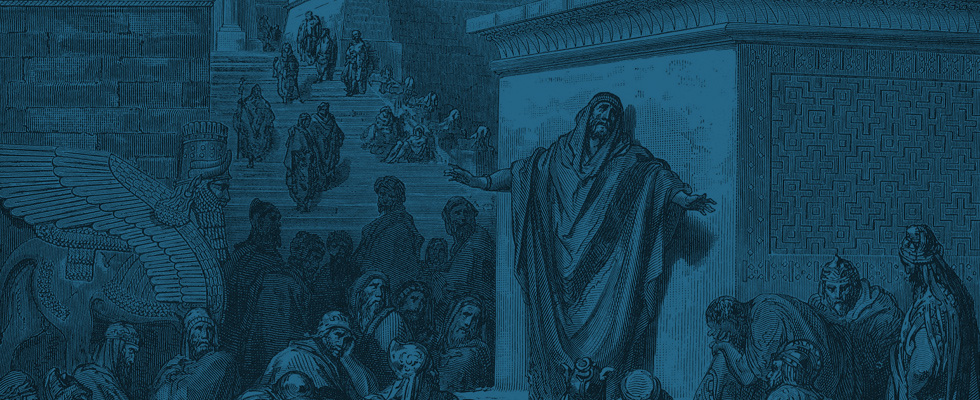Everybody knows the story of Jonah – how he tried to run away from God, but was swallowed by a great fish, and then went on to preach at Nineveh. But there are actually two main stories going on – how God deals with Jonah and how God deals with Nineveh. So we will be looking at both subjects in our study. Martin Luther commented about the prophet Jonah: ‘a queer and odd saint who is angry because of God’s mercy for sinners … And yet he is God’s dear child.’
Jonah is all about history
We have to say this, because so many people, including professing evangelicals, like Leslie Allen and F. F. Bruce, say that Jonah is a myth or a parable. They say that fish do not swallow people for three days, and that Nineveh never turned to God. But consider two things:
(a) the Old Testament treats Jonah as an historical person. He is mentioned in 2 Kings 14:25 as the prophet who told of the Lord’s restoration of the border of Israel in the days of King Jeroboam II. Jonah was flesh and blood, living in Israel in Gath Hepher, just north of Nazareth in the 8th century B.C., a time of great prosperity and great corruption – rather like today.
(b) Jesus treats Jonah as history (Matt.12:39-41). If Jonah’s being three days in the great fish is a myth (the Jews count part of a day as a full day), so too would be Christ’s three days in the tomb. Liberals might mock: ‘The Bible is credible if Jonah was edible.’ But we are dealing with history that happened, not a myth or a parable.
Jonah is commissioned by God
The word of the Lord came to Jonah (1:1); he did not make it up. In fact, Jonah had already been a prophet for some years in Israel in the days of King Jeroboam II, who reigned from about 793 B.C. to 753 B.C. There, Jonah’s message was that Israel would be enlarged. That would have been a rather soft message for a prophet to have given – no denunciation of evil kings or the like, just a message that God was going to bless His people. The church would grow! I daresay that Jonah was quite popular with a message like that.
God came to this prophet and gave him another message for another place. Jonah did not fall over backwards in gratitude. Not at all! ‘Jonah’ apparently means ‘Dove’ but it might well have meant ‘hawk’ so far as Jonah himself was concerned. This was not a welcome revelation from God. Jonah is taken out of his comfort zone. So often God does the unexpected.
‘Arise, go to Nineveh, that great city, and call out against it” (1:2a). Leave Israel, and go to Nineveh, the great city which became the capital of the Assyrian empire. The Assyrians were ruled by gangster-kings who were renowned for their cruelty. They boasted of flaying their victims alive, gauging out their eyes, and tearing out their tongues. Yet they were often transvestites who paraded about in women’s robes. That is certainly true of the renowned Ashurbanipal. There is a link between cruelty and perversion. One Jewish writer refers to the Assyrians as ‘the Nazi storm-troopers of the ancient world’.
Jonah had to travel to Nineveh and preach against its wickedness. He was not there to entertain them, and make them feel good about themselves, but to bring about a conviction of sin. The book of Nahum was written a century later than the book of Jonah, but it describes Nineveh’s sins – bloodshed, lies, plunder, fighting, immorality (Nah.3:1-4). Sow the view that God’s judgment is a joke, and you reap the view that you can do whatever you like. Tell twelve-year olds that the only thing that matters about sex is that it is safe, and the result is that peoples’ lives are left in a shambles. Promote the Oxford Street culture, and there are consequences.
Yet there is hope in this message. God’s command to repent is also an offer of grace (Acts 17:30). There is no group that is so degraded or so vicious that it is excluded. If the command to repent goes to all, it goes to the Assyrians and to the likes of us, and to the worst people we can think of.
Jonah tries to flee from God
But Jonah fled the other way (1:3). Nineveh was to the north-east, but Jonah went down to Joppa on the coast, and found a ship going to Tarshish, which is probably in Spain, although Josephus thought it was Tarsus in Asia Minor. When God called Moses, he had an excuse – he was no public speaker (Ex.4:10). When God called Jeremiah, he also had an excuse – he was too young (Jer.1:6). But Jonah did not argue. He simply took off in the opposite direction. Twice it is said that Jonah was fleeing from the presence of the Lord.
Have you noticed how sin makes us stupid? How do you flee from God? It cannot be done (Ps.139:7-10). Jonah knew that. He could have sat in a theology exam and written an essay on ‘The Omnipresence of God’. But here he is acting as if that were not true, as if he could flee the presence of God who is everywhere.
Why did he try to run away from God? Was he afraid? That might be why we fail to obey God. But for Jonah, it was because the God who had revealed Himself as gracious and slow to anger and merciful to His covenant people Israel (Ex.34:6) might well reveal Himself in the same way to the Gentile city of Nineveh (Jonah 4:2). Some commentators, like Hugh Martin and O. Palmer Robertson, have tried to soften this and say that Jonah feared that the blessing would go from Israel to Assyria, and that he only wanted to protect his people. But it seems to me that Jonah is saying more than that. What if a Jewish Christian was asked to preach the gospel of free forgiveness in Christ to the Nazis? Could you imagine him being less than keen?
That is how Jonah felt. These Assyrians have been utter brutes; they deserve to get it in the neck. There are two truths we hold together: God is strictly just and hates sin with a perfect hatred, and God is gracious and merciful to all who repent and come to Him. It is in William Faber’s hymn:
For the love of God is broader
Than the measures of man’s mind;
And the heart of the Eternal
Is most wonderfully kind.
‘Christ died for the ungodly’ is the New Testament message (Rom.5:6). It is not only Nineveh that was to learn that for the first time, but Jonah himself had to relearn that. Even those who truly know God can flee from Him. But He is the God who will settle for nothing less than heartfelt trust and obedience.




















